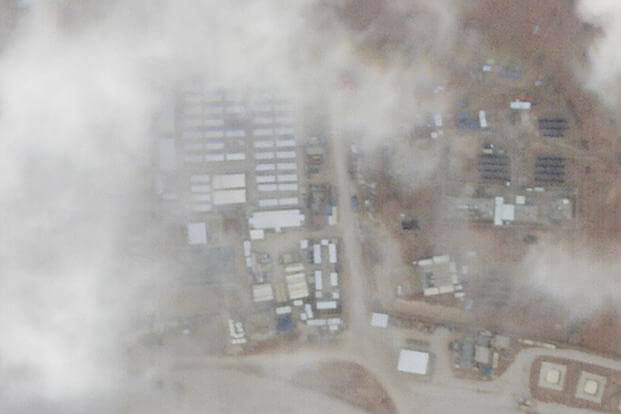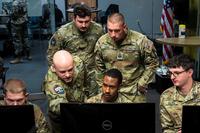WASHINGTON — The U.S. military launched an air assault on dozens of sites in Iraq and Syria used by Iranian-backed militias and the Iranian Revolutionary Guard Quds force Friday, in the opening salvo of retaliation for the drone strike that killed three U.S. troops in Jordan last weekend, officials told The Associated Press.
President Joe Biden and other top U.S. leaders had been warning for days that America would strike back at the militias, and they made it clear it wouldn't be just one hit but a "tiered response" over time. The officials confirming the initial strikes spoke on condition of anonymity to discuss military operations not yet announced.
The strikes by manned and unmanned aircraft hit more than 85 targets, including command and control headquarters, intelligence centers, rockets and missiles, drone and ammunition storage sites and other facilities. U.S. Central Command said the strikes used more than 125 precision munitions, and they were delivered by numerous aircraft, inlcuding long-range bombers flown from the United States. One official said B-1 bombers were used.
Omar Abu Layla, a Europe-based activist who heads the Deir Ezzor 24 media outlet, said the strikes hit areas in east Syria including the countryside of Mayadeen, Quriya and Rahba that is home to a telecommunications center for Iran's paramilitary Revolutionary Guard and arms depot in Boukamal along the Iraq border.
The assault came came just hours after Biden and top defense leaders joined grieving families to watch as the remains of the three Army Reserve soldiers were returned to the U.S. at Dover Air Force Base in Delaware.
It was unclear what the next steps will be, or whether the days of U.S. warnings have sent militia members scattering into hiding, making it more difficult to detect and strike them. But it was evident that the recent statement released by Kataeb Hezbollah, one of the main Iran-backed militias, saying it was suspending attacks on American troops had no impact on the administration's plans.
The U.S. strikes appeared to stop short of directly targeting Iran or senior leaders of the Revolutionary Guard Quds force within its borders. Iran has denied it was behind the Jordan attack.
In a statement this week, Kataib Hezbollah announced "the suspension of military and security operations against the occupation forces in order to prevent embarrassment to the Iraqi government." But Harakat al-Nujaba, one of the other major Iran-backed groups, vowed Friday to continue military operations against U.S. troops.
The U.S. has blamed the Islamic Resistance in Iraq, a broad coalition of Iran-backed militias, for the deadly attack in Jordan, but has not yet narrowed it down to a specific group. Kataeb Hezbollah is, however, a top suspect.
Some of the militias have been a threat to U.S. bases for years, but the groups intensified their assaults in the wake of Israel's war with Hamas following the Oct. 7 attack on Israel. The war has led to the deaths of thousands of civilians in Gaza and spilled across four other countries now. Iran-backed militia groups throughout the region have used the conflict to justify striking Israeli or U.S. interests, including threatening civilian commercial ships and U.S. warships with drones or missiles in almost daily exchanges.
Speaking to reporters on Thursday, Defense Secretary Lloyd Austin said that "this is a dangerous moment in the Middle East." He added, "We will take all necessary actions to defend the United States, our interests and our people. And we will respond when we choose, where we choose and how we choose."
"At this point, it's time to take away even more capability than we've taken in the past," Austin said.
As of Tuesday, Iran-backed militia groups had launched 166 attacks on U.S. military installations since Oct. 18, including 67 in Iraq, 98 in Syria and now one in Jordan, according to a U.S. military official. The last attack was Jan. 29 at at al-Asad airbase in Iraq, and there were no injuries or damage.
The U.S., meanwhile, has bolstered defenses at the base in Jordan that was attacked by the ran-backed militants on Sunday, according to a U.S. official.
And the Israeli military said its Arrow defense system intercepted a missile that approached the country from the Red Sea, raising suspicion it was launched by Yemen's Houthi rebels. The rebels did not immediately claim responsibility.
A U.S. official also said the military had taken additional self-defense strikes inside Yemen Friday against Houthi military targets deemed an imminent threat. Al-Masirah, a Houthi-run satellite news channel, said that British and American forces conducted three strikes in the northern Yemeni province of Hajjah, a Houthi stronghold.
While previous U.S. responses in Iraq and Syria have been more limited, the attack on Tower 22, as the Jordan outpost is known, and the deaths of the three service members has crossed a line, the official said.
That drone attack, which also injured more than 40 service members — largely Army National Guard — was the first to result in U.S. combat deaths from the Iran-backed militias since the war between Israel and Hamas broke out. Tower 22 houses about 350 U.S. troops and sits near the demilitarized zone on the border between Jordan and Syria. The Iraqi border is only 6 miles (10 kilometers) away.
Also on Friday, the U.S. Treasury imposed new sanctions on a network of firms in Iran and Hong Kong that are accused of assisting Iran procure technology to make ballistic weapons and drones. And the U.S. hit six Iranian officials with sanctions for allegedly committing a series of malicious cyber activities against critical infrastructure in the U.S. and other nations.
—-
Aamer Mahdani and Fatima Hussein contributed from Washington, D.C. Bassem Mroue contributed from Beirut. Abdulrahman Zeyad reported from Baghdad, Jon Gambrell reported from Jerusalem and Ahmed al-Haj contributed from Yemen.











